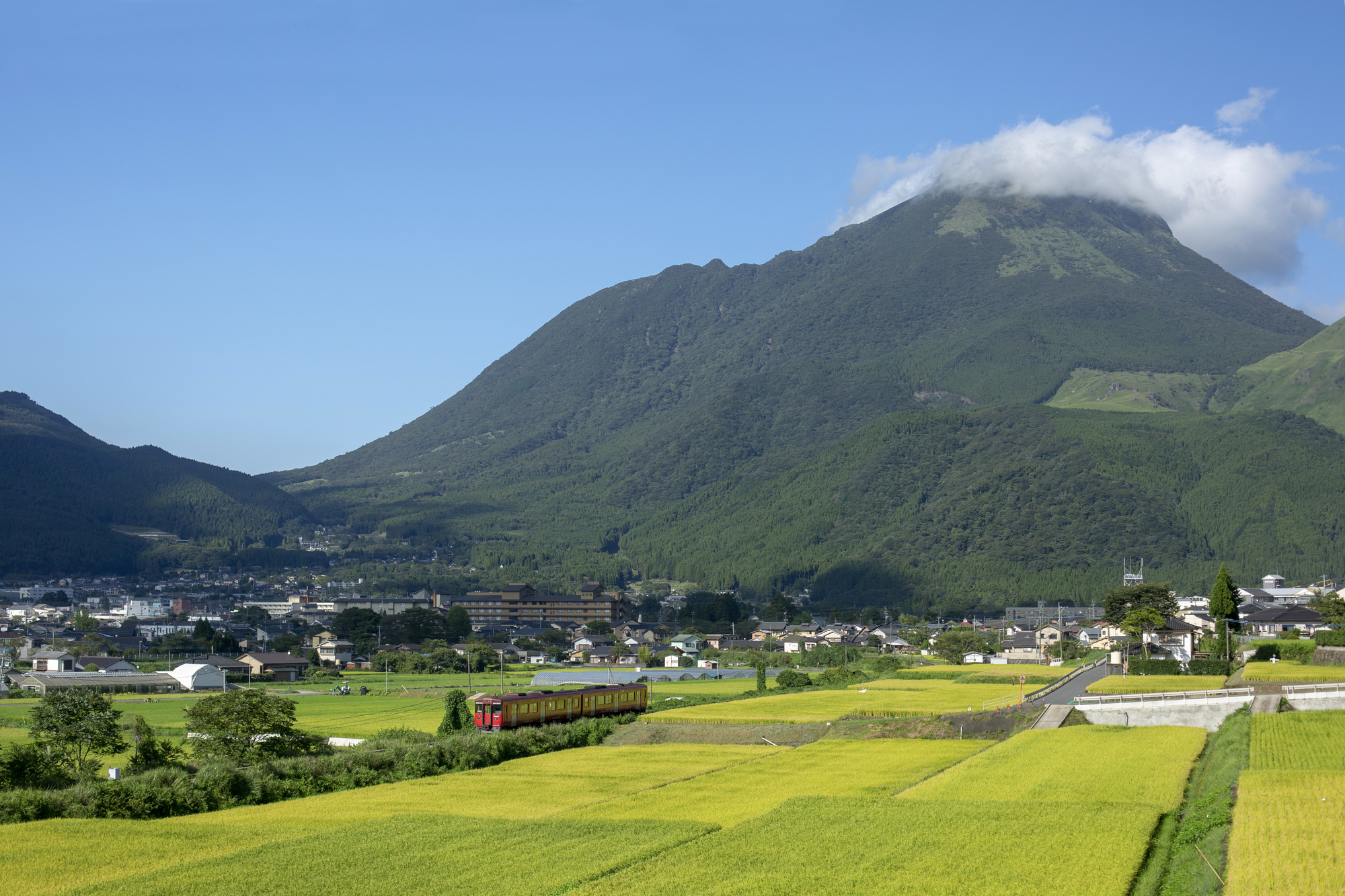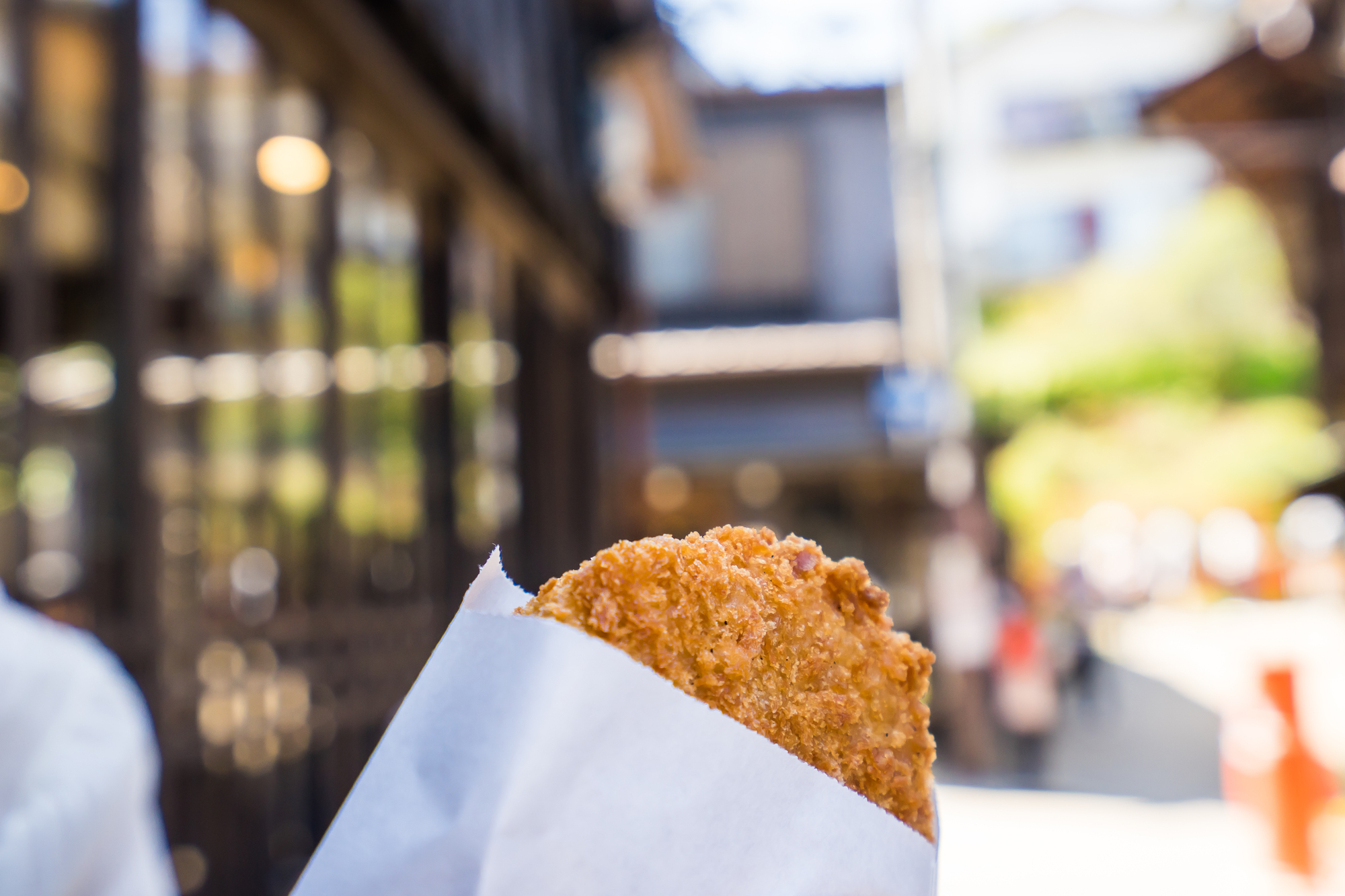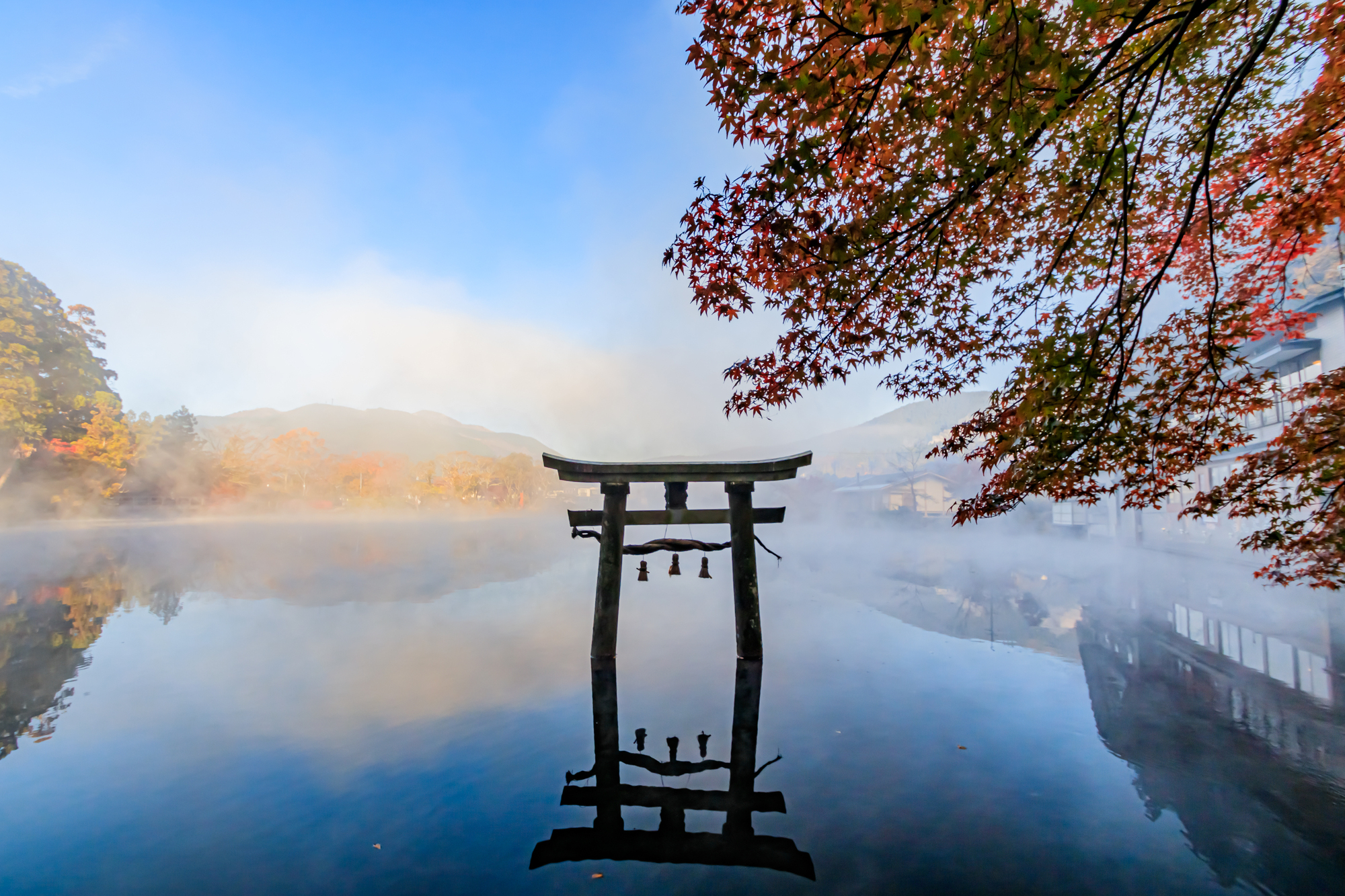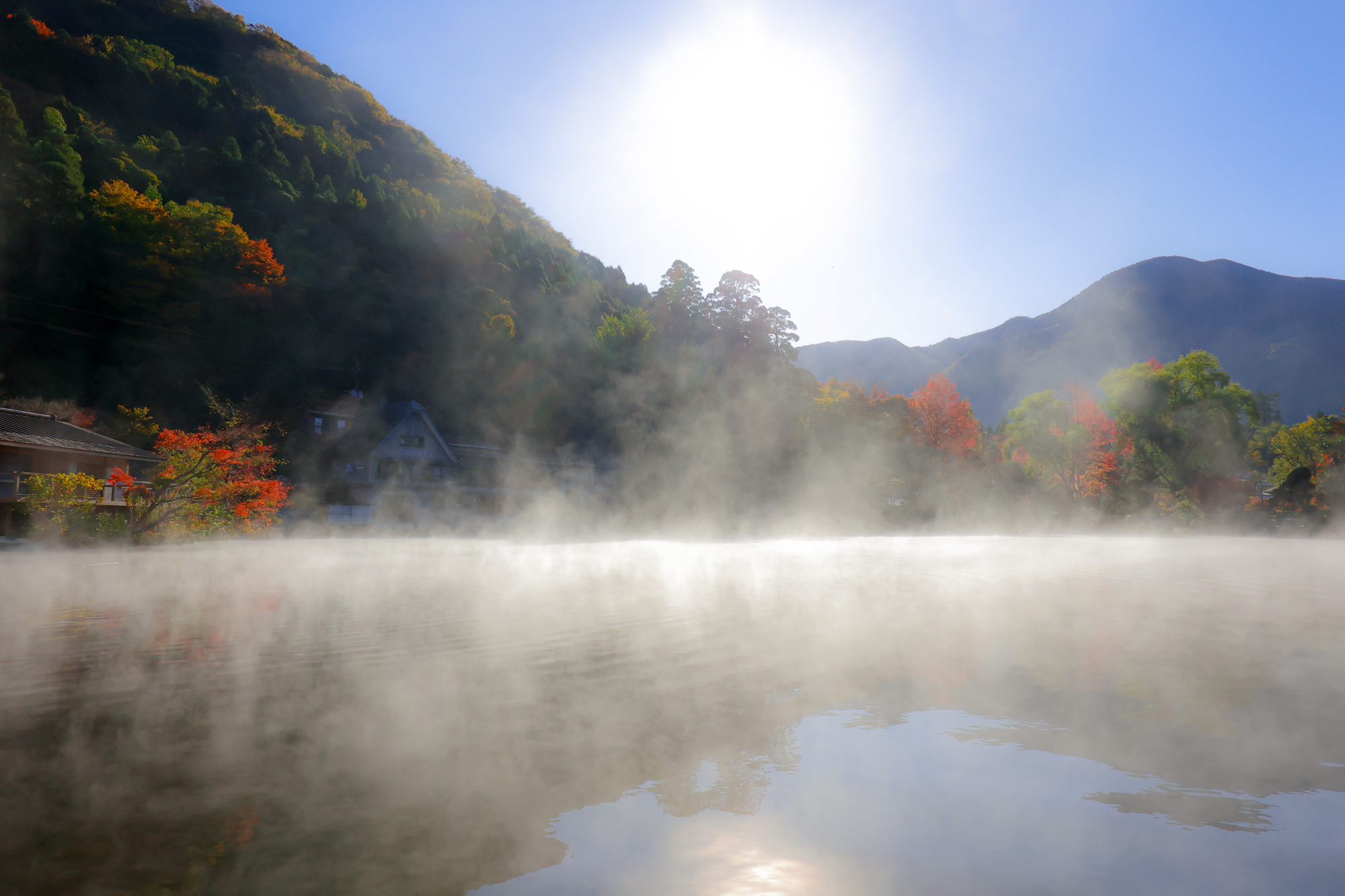Complete Yufuin Onsen GuideEtiquette & Spots for a Relaxing Holiday of Art and Nature
Table of Contents
Welcome to Yufuin, a Tranquil Rural Onsen Village

At the foot of the majestic Mount Yufu lies a tranquil rural landscape dotted with sophisticated shops, art museums, and high-quality onsen inns—this is Yufuin Onsen. Setting itself apart from bustling hot spring towns with flashy neon signs and large entertainment districts, this culturally rich place, scented with art, music, and cinema, offers visitors a calm and fulfilling time.
While many guidebooks stop at listing famous spots, this guide delves deeper into the "why" behind Yufuin's charm, along with concrete manners and a mindset to maximize the quality of your trip. It carefully explains the etiquette for enjoying a journey that blends in with nature and culture, respecting the quiet and calm atmosphere that this land has protected for decades, all from the perspective of an international visitor.
The magical scenery of Lake Kinrin shrouded in morning mist, delightful encounters on Yunotsubo Kaido street, and a moment of healing in an open-air bath with a view of Mount Yufu. Knowing that each of these experiences is built upon the town's history and the residents' wishes will not only release your journey from the hustle and bustle of daily life but also make it a more enriching experience for the soul. Now, let's begin a special Yufuin holiday to be healed by art and nature.
1.From a Quiet Hot Spring Retreat to a Town of Art: The History and Culture of Yufuin
The charm of Yufuin lies not only in its beautiful nature but also in the dignified cultural atmosphere nurtured by its unique town development, which sets it apart from other onsen towns.
1-1. Seeking Calmness Over Bustle: A Unique Town Development
Yufuin has long been known as a hot spring area, but its history of development is unique. In the 1970s, during Japan's period of high economic growth, when onsen towns across the country were pursuing large-scale hotel construction and becoming entertainment districts, Yufuin stood at a crossroads. However, the town mayor and ryokan owners of the time learned from the "quiet health resorts of Germany" and rejected large-scale development, choosing the path of a "quiet and calm hot spring health resort."
Specifically, they established their own regulations on the height, color, and design of buildings to protect the landscape. This suppressed flashy signs and tall buildings, preserving the magnificent rural scenery with views of Mount Yufu. The serene landscape of Yufuin we see today was not created overnight; it is the result of the firm philosophy and efforts of its predecessors. Knowing this background is essential to understanding the true value of Yufuin.
1-2. A Town Scented with Art, Cinema, and Music: Creating Charm Through Culture
Yufuin's reputation as a "town of art" is also deeply related to this unique town planning. Instead of relying on large-scale entertainment facilities, "culture" was chosen to enhance the town's appeal. The "Yufuin Music Festival," which began in 1975, became a pioneering event for enjoying first-class music in a rich natural setting. The following year, the "Yufuin Film Festival," which values a handmade warmth, was launched. These events received high praise nationwide and became a catalyst for many cultural figures and artists to visit Yufuin.
Through interactions with them, unique art museums, galleries, and sophisticated cafes and shops were born one after another in the town. The reason strolling through Yufuin is so enjoyable is not just because you are walking through beautiful scenery, but because there are encounters with these culturally rich spaces at every turn.
1-3. [2025 Latest] Yufuin Today and Its Sustainable Initiatives
![1-3. [2025 Latest] Yufuin Today and Its Sustainable Initiatives](/library/689c2e896e58203ab69c5bd3/68cb8135eb87944c73c07668.jpg)
Today, Yufuin has become a popular tourist destination visited by about 4 million people annually from both Japan and abroad. To maintain its popularity while passing on the environment and culture it has protected and nurtured to the future, sustainable tourism initiatives are crucial.
Specifically, efforts are being made to promote "micro-tourism" that highlights the charms of quieter areas away from the tourist-concentrated Yunotsubo Kaido, and to promote a food culture that utilizes fresh local vegetables and Bungo beef. As visitors, we can also become a part of supporting this beautiful town by actively consuming local products and reducing waste.
2.Travel Preparation and Basic Information: The First Step to a Smart Journey
2-1. A Thorough Comparison of Access from Fukuoka & Oita (JR & Highway Bus)
Choose your access to Yufuin based on your departure point and travel style.
- JR (Highly Recommended for a Scenic Journey): Features: The "Yufuin no Mori" scenic limited express from Hakata Station is a special train that turns travel time into a tourist experience, with its retro, luxurious interior, onboard sightseeing announcements, and limited-edition sweets sold at the buffet. All seats are reserved, so booking in advance is essential. Note: The regular limited express "Yufu" also operates, but its interior and services are different. Be sure to check the train name when booking.
- Highway Bus: Features: Frequent direct buses from Fukuoka Airport, Hakata Station, and Oita Airport to the Yufuin Ekimae Bus Center offer easy, transfer-free access. This is the most efficient option, especially for air travelers. Note: On weekends and holidays, arrival may be delayed due to highway traffic congestion. Plan your schedule with extra time.
2-2. Getting Around Yufuin: Unique and Fun Rides for Strolling
Yufuin's main area is compact enough to be explored on foot. However, unique and enjoyable modes of transport are also available for exploring the town more efficiently and broadly.
- Tsuji-basha (Horse-drawn Carriage): Departing from Yufuin Station, this carriage takes you on a 50-minute tour of quieter areas away from Yunotsubo Kaido, such as Bussanji Temple and Unagihime Shrine. The sound of hooves and the gentle rocking perfectly match Yufuin's idyllic scenery. Reservations are made on the day of the ride at the tourist information center inside Yufuin Station. It's very popular and often fills up early, so it's best to book as soon as you arrive.
- "Scarborough" Tourist Bus: A retro bus modeled after a classic bus from a rural English town. It tours the town's main spots, like Yufuin Floral Village and Kozenin Temple, in about 50 minutes. It follows a different route from the horse-drawn carriage, so trying both can be fun.
- Rental Bicycles: Several rental shops are located near the station. An electric-assist bicycle makes it easy to access areas with gentle slopes. It's perfect for those who want to explore freely at their own pace.
2-3. Travel Tip: The Importance of Finding Your Perfect Accommodation
It's no exaggeration to say that the satisfaction of your Yufuin trip greatly depends on your choice of accommodation.
- Diverse Options: The choices are incredibly varied, from the top-tier luxury ryokans known as the "Gosanke" to warm, family-run pensions, art-themed inns, and affordable lodgings for room-only stays.
- Points for Choosing an Inn: Think about what you value most. Each inn competes with its unique charms, such as "an open-air bath with a spectacular view of Mount Yufu," "creative cuisine using local ingredients like Bungo beef," "private detached rooms for a sense of seclusion," or "an artistic space with an attached gallery." Carefully comparing photos on official websites and booking sites to find the inn that will make your ideal holiday a reality is the key to creating the best memories of your stay in Yufuin.
3.[By Area] Popular Tourist Spots and Etiquette to Know
3-1. Yunotsubo Kaido Area: Strolling and Street Food Manners

The 1.5km "Yunotsubo Kaido" street leading from Yufuin Station to Lake Kinrin is the heart of Yufuin tourism.
Strolling Etiquette: This street also serves as a local road, and cars and delivery trucks of residents pass through. The road is not wide, so avoid walking spread out and be considerate of other pedestrians and vehicles. It gets very crowded, especially on weekends, so a spirit of mutual courtesy is important.
Street Food Manners: There are many tempting gourmet foods like croquettes, puddings, and soft-serve ice cream, but it is dangerous to eat while walking in the crowd. The basic manner is to eat while standing in front of the shop where you bought it or in the eat-in space provided by the shop. This way, you can enjoy your food slowly without worrying about soiling other people's clothes. Always dispose of your trash in the shop's bin, or if there is none, take it with you.
3-2. Lake Kinrin Area: Preserving the Magical Scenery

Lake Kinrin, where hot springs and fresh water well up from the lake bottom, is a mystical place that symbolizes Yufuin.
Mindset for Viewing Morning Mist: The morning mist rising from the lake on cold early mornings from autumn to winter is breathtakingly magical. This scenery's beauty is enhanced in silence. When visiting early in the morning, turn off your mobile phone's ringer, speak in a low voice or not at all, and quietly savor the moment. If you set up a tripod, place it where it will not obstruct other viewers or walkers.
Respect for the Natural Environment: Lake Kinrin has a precious ecosystem. Do not throw trash into the lake or feed the fish. Walk quietly along the lakeside promenade and remember to respect nature.
3-3. Mount Yufu View Spots: Consideration for Quietly Enjoying the Spectacular Views
While Mount Yufu can be seen from anywhere in Yufuin, there are particularly beautiful viewpoints.
Manners in Rural Areas: The rural areas of the Yufuin basin offer idyllic landscapes with Mount Yufu in the background, but most of this land is private property and the livelihood of farmers. Just because it's beautiful, do not enter farm roads, paths between fields, or fields without permission. When taking photos, always do so from public roads and be considerate not to disturb farm work.
Note at Sagiridai Observatory: This observatory offers a panoramic view of the Yufuin basin, but parking is limited. Avoid long-term parking and use the space considerately.
4-1. Onsen Edition: How to Fully Enjoy High-Quality Hot Springs
The waters of Yufuin are mainly simple hot springs that are gentle on the skin.
Basic Bathing Manners: Always follow the basics of Japanese onsen etiquette: "kakeyu" (rinsing your body before entering the bathtub), "do not put your towel in the bath," and "do not swim or be loud in the bath."
Mindset for Day-Use Onsen: Many ryokans accept day-trippers for bathing, but the hours are limited (e.g., 11 AM to 3 PM). Always check the hours in advance and be extra quiet, being mindful that it is a time when overnight guests are relaxing.
4-2. Strolling Edition: Consideration to Not Spoil Yufuin's Atmosphere
The charm of Yufuin is the "calmness" and "elegance" that flows through the entire town.
Quiet Strolling: Actions like talking loudly while walking or playing music can spoil the town's atmosphere. Especially in residential areas and rural landscapes, be considerate of the local residents' lives and act quietly.
Attire: Just because it's an onsen town, walking around a wide area of the main street in a yukata and slippers is generally not preferred, except in some areas. It is smarter to change into regular clothes when leaving the inn's premises, especially when visiting restaurants or museums.
4-3. Dining & Shopping: How to Encounter Local Delicacies and Artistic Finds
Behavior at Restaurants: Yufuin has many high-quality restaurants that use local ingredients. If you have a reservation, be on time. If you must cancel, it is basic manners to contact them in advance.
Viewing at Galleries: Yunotsubo Kaido has many galleries that handle ceramics, glassware, and woodwork. The works are created with heart by the artists. Please enjoy them with your eyes first without touching them carelessly. If you want to take a photo, always ask for permission from the shop staff.
4-4. Coexisting with Nature: Awareness as Part of a National Park
The Yufuin area is designated as part of the Aso-Kuju National Park.
Trash Disposal: There are few trash cans in town. This is because it is expected that everyone will take their trash home. To protect the beautiful scenery, never litter.
Protection of Flora and Fauna: The wildflowers and insects on the roadside are also a precious part of the national park. Do not pick or harm them.
5.Planning Your Trip: Model Courses for Practicing Good Manners
5-1. [Day Trip] Classic Course around Yunotsubo Kaido and Lake Kinrin!
- 10:00 AM: Arrive at Yufuin Station by JR or highway bus. Try to book a horse-drawn carriage at the tourist information center inside the station (you're lucky if there's a spot).
- 10:30 AM: Start strolling from the station along Yunotsubo Kaido. Slowly head towards Lake Kinrin, popping into shops that catch your eye.
- 12:30 PM: Arrive at Lake Kinrin. Walk around the lake and visit Tenso Shrine. Take a break at a lakeside cafe.
- 1:30 PM: Return to Yunotsubo Kaido and enjoy lunch, such as local chicken or Bungo beef mabushi.
- 3:00 PM: Explore dessert shops (pudding, roll cakes, etc.) along the street or look for souvenirs.
- 4:30 PM: Soothe your travel fatigue at a day-use onsen near the station, like "Yufuin Ekimae Onsen."
- 6:00 PM: Depart from Yufuin Station.
5-2. [1-Night, 2-Day] Full Course to Savor Art, Onsen, and Views
- Day 1: 1:00 PM: Arrive in Yufuin. First, have lunch near the station. 2:30 PM: Drop off your luggage at your inn, then stroll along Yunotsubo Kaido. Enjoy themed facilities like Yufuin Floral Village or Trick 3D Art Yufuin. 4:30 PM: Check into your inn early. Relax to your heart's content in an open-air bath with a view of Mount Yufu. 7:00 PM: Savor a dinner featuring plenty of local ingredients at your inn.
- Day 2: 6:30 AM: Wake up early for a walk around the magical, mist-covered Lake Kinrin. Take a deep breath in the silence. 8:30 AM: Have breakfast at your inn. 10:00 AM: Enjoy a 50-minute tour on a pre-booked horse-drawn carriage. 11:30 AM: After checking out, leave your luggage and explore some art at the Yufuin Stained Glass Museum or the Marc Chagall Yufuin Kinrinko Museum. 1:30 PM: Have lunch with some gourmet food you haven't tried yet on Yunotsubo Kaido. 3:00 PM: Look for souvenirs around the station and have a final relaxing moment at the station's footbath. 4:30 PM: Head home on the limited express "Yufuin no Mori."
A Healing Landscape to Remember

A trip to Yufuin is not just a stamp rally of tourist spots. It's a luxurious holiday to reclaim your own time and reset your mind, surrounded by beautiful nature and art. The small considerations introduced in this guide are like a passport to respecting the unique atmosphere that Yufuin has preserved and becoming a part of it. Surely, the majestic figure of Mount Yufu, the quiet surface of Lake Kinrin, and the warm hospitality of the local people will be deeply engraved in your heart.

